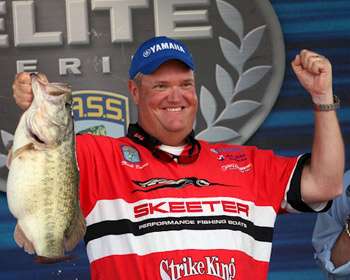
When bass fishermen get together to compare notes, it often devolves into a competition over whose boat is the fastest, whose boat handles rough water the best or whose boat has the best layout. It's only infrequently that we sit down and compare tow vehicles.
Your boat may be the greatest thing since the plastic worm, but if you can't get it to the lake, it's not worth much. You won't catch a lot of fish in your driveway or broken down on the side of the highway, so it's critical that every angler take stock of his vehicle needs and address them appropriately. As gas prices surge and our highways nevertheless seem more crowded than ever, you want to get the right pickup or SUV without spending any more than you have to.
Arkansas Elite Series pro Mark Davis is a veteran road warrior. He's towed from Champlain to Florida and out to California. Time is money, and he can't afford to break down or get in an accident. He believes that it's critical for the touring pro to get a truck suited to the job.
For him, that means a diesel hauler. "To me, the main 'must have' is a lot of torque to get from zero to thirty-five," he says. "Gas rigs will do it, but diesels do it a lot better. You need to be able to get out in traffic. More accidents happen pulling out into traffic and trying to merge from an on-ramp or across a couple of lanes of traffic, so low-end torque is a necessity."
"The weekend guy really doesn't need a three-quarter ton truck, but if you're towing across country the way I do, you need a three-quarter ton truck to have the bigger brakes and the extra suspension." If a diesel puller is not in your immediate future for one reason or another, he suggests that anglers add on certain accessories to ensure that critical parts not break down.
"I'd recommend a transmission cooler," he says, "The factory towing package should include that, but if it doesn't, and you're towing with a half-ton truck, it's not that expensive to add." Whether you run conventional gas or diesel, the transmission is a critical link. It has to be able to take the abuse of long drives and keep on ticking.
Accordingly, Davis recommends that you service your transmission every 50,000 miles. If you're going to keep a rig for a while and try to run it 100,000 or more miles, you really need to make sure you service it," he says. That service involves changing the filter and fluid, and thoroughly inspecting the transmission system. "It's basically a simple filter change. It's not very expensive to do, but it really adds a lot to the life of your transmission," he suggests.
You also need to pay attention to the components under your truck and behind it. The urge to save a few dollars can be disastrous. "Don't skimp when it comes to a hitch," Davis says. "I see a lot of guys trying to save money on a hitch ball. I've seen accidents happen due to a ball breaking. Go ahead and spend an extra 25 bucks and get a good 2-inch ball." And don't rely on a bumper hitch, he adds. Install a hitch system that attaches to the frame. While good low-end torque is necessary to get you going, you have to be able to stop as well. In fact that may be even more critical.
"Trailer brakes are definitely recommended. And make sure your trailer brakes are in good working order," Davis recommends. "When a trailer begins to age, leaks can develop in the braking system. You might be low on fluid without knowing it. Have your brakes checked out.
"Trailer brakes are something we take for granted until we need them, but when we do need them, they'd better work. You might go four or five years without having to stop so suddenly. But when that time comes, if your brakes fail, it's going to cause you to 'rear-end' someone."
(Provided by Z3 Media)





